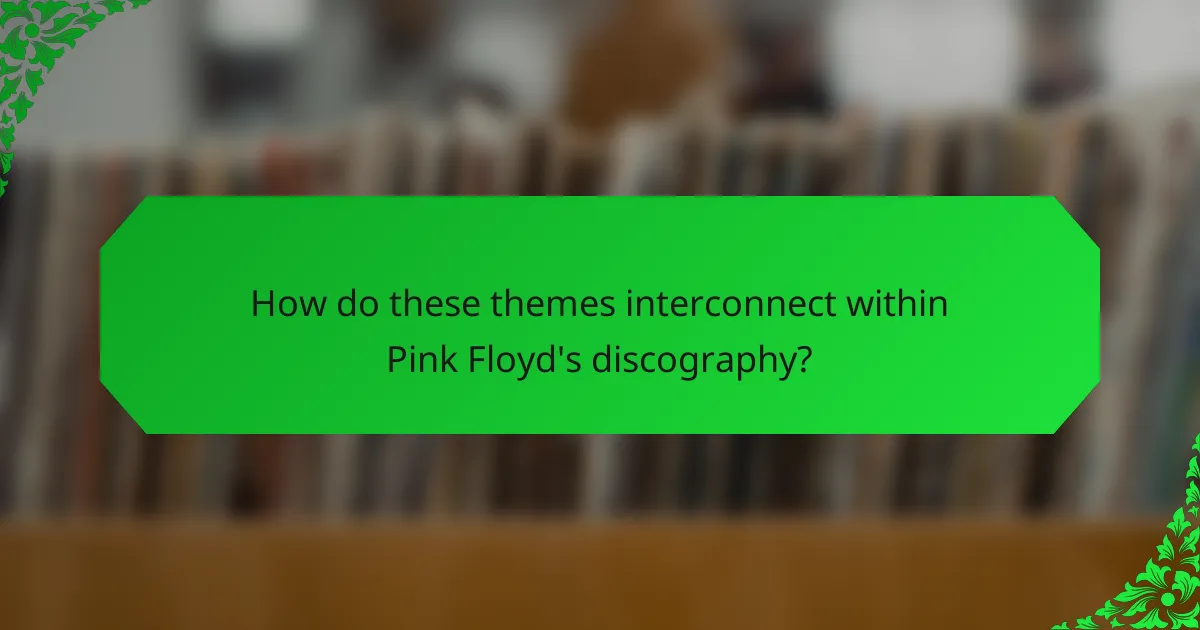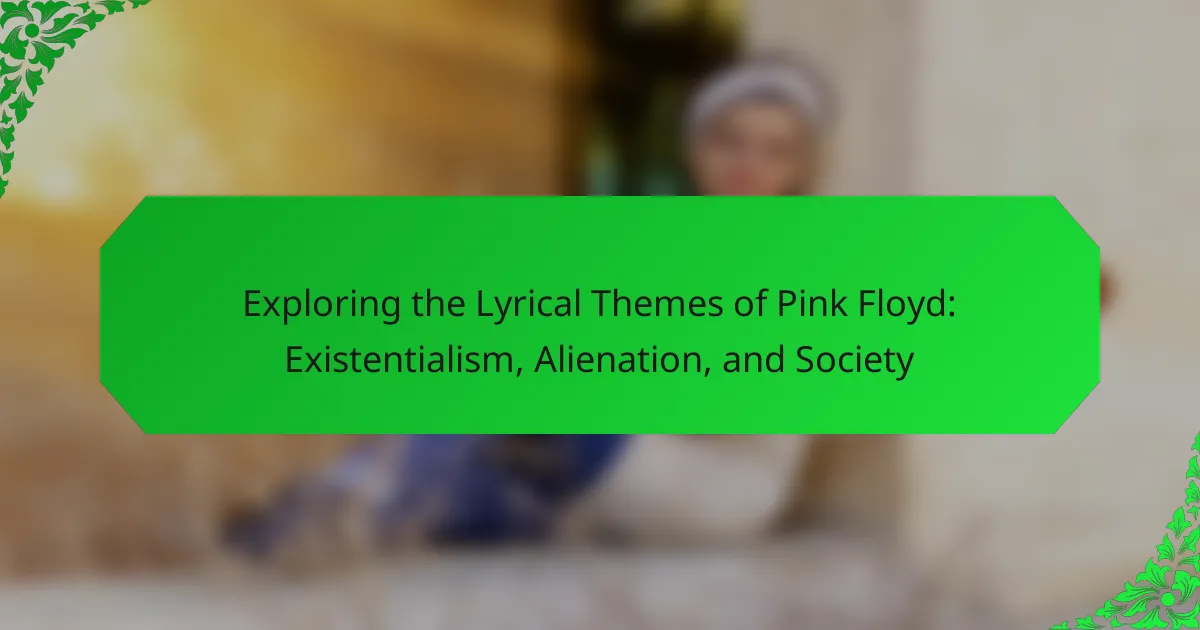Pink Floyd is a renowned rock band known for their profound lyrical themes, primarily focusing on existentialism, alienation, and societal critique. The article explores how these themes manifest in their music, with notable examples including “Time,” “Comfortably Numb,” and “Another Brick in the Wall.” It discusses the interconnectedness of these themes throughout their discography, highlighting their exploration of the human experience, mental health, and societal issues. The impact of Pink Floyd’s lyrics on listeners and culture is also examined, emphasizing their role in fostering discussions around individuality and authority. Overall, the article provides a comprehensive analysis of how Pink Floyd’s themes resonate with audiences and influence various art forms.

What are the key lyrical themes in Pink Floyd’s music?
Key lyrical themes in Pink Floyd’s music include existentialism, alienation, and societal critique. Existentialism is reflected in songs like “Time,” which explores the nature of existence and the passage of time. Alienation is a prominent theme in “Comfortably Numb,” depicting feelings of isolation and disconnection. The band’s critique of society is evident in “Another Brick in the Wall,” which addresses the oppressive nature of education and conformity. These themes resonate throughout their discography, illustrating a deep engagement with human experience and societal issues.
How does existentialism manifest in Pink Floyd’s lyrics?
Existentialism manifests in Pink Floyd’s lyrics through themes of alienation, despair, and the search for meaning. Songs like “Comfortably Numb” depict feelings of disconnection from reality and self. The lyrics express a struggle against societal norms and the pressure of existence. “Time” reflects on the fleeting nature of life and the inevitability of death. The line “You are young and life is long” highlights the tension between youth and the passage of time. Additionally, “The Wall” explores the construction of emotional barriers to cope with existential dread. These themes resonate with existentialist philosophers like Jean-Paul Sartre and Albert Camus. Pink Floyd’s work serves as a reflection on the human condition and the quest for authenticity.
What specific songs illustrate existential themes?
“Time” by Pink Floyd illustrates existential themes through its exploration of mortality and the passage of time. The lyrics highlight the fleeting nature of life. They convey a sense of urgency to make the most of one’s existence. Another song, “The Great Gig in the Sky,” addresses the inevitability of death. It presents the emotional struggle of facing mortality. “Comfortably Numb” explores feelings of alienation and disconnection from reality. The song reflects on the search for identity and meaning. Lastly, “Wish You Were Here” expresses longing and a sense of loss. It questions the authenticity of existence in a disconnected world. These songs collectively encapsulate existential themes prevalent in Pink Floyd’s work.
How do existential questions reflect the human experience in their music?
Existential questions in music reflect the human experience by addressing themes of identity, purpose, and mortality. Pink Floyd’s lyrics often explore these topics, resonating with listeners’ personal struggles. Songs like “Time” and “The Great Gig in the Sky” delve into the passage of time and the inevitability of death. These existential themes evoke emotional responses, prompting introspection and connection among audiences. The band’s use of metaphor and imagery enhances the impact of these questions. This approach allows listeners to confront their own existential dilemmas, making the music deeply relatable.
In what ways does alienation appear in Pink Floyd’s work?
Alienation appears in Pink Floyd’s work through themes of isolation, disconnection, and existential despair. The lyrics often depict characters feeling estranged from society and themselves. In “The Wall,” the protagonist builds a metaphorical wall to shield himself from emotional pain. This wall symbolizes the barriers people create due to alienation.
The song “Comfortably Numb” illustrates a sense of detachment from reality and a longing for connection. The character experiences a profound sense of disconnection from his own emotions. In “Wish You Were Here,” the lyrics express yearning for lost connections and the feeling of being out of place in the world.
Pink Floyd’s music often reflects societal alienation, highlighting the pressures of modern life. The band critiques the dehumanizing aspects of society, reinforcing feelings of isolation. Their exploration of these themes resonates with listeners, making alienation a central motif in their work.
What are the lyrical examples of alienation in their albums?
Pink Floyd’s albums contain numerous lyrical examples of alienation. In “The Wall,” the song “Another Brick in the Wall” expresses feelings of isolation and disconnection from society. The lyrics illustrate the impact of rigid education systems on personal identity. “Comfortably Numb” explores the theme of emotional detachment and the numbness that comes from alienation. The protagonist feels disconnected from reality and experiences a sense of being trapped. In “Wish You Were Here,” the title track reflects on the longing for connection and the feeling of being lost in a materialistic world. The lyrics convey a deep sense of absence and yearning for genuine relationships. Overall, Pink Floyd’s exploration of alienation resonates through their poignant lyrics and themes across multiple albums.
How does alienation affect the listener’s connection to the music?
Alienation diminishes the listener’s emotional connection to the music. It creates a sense of detachment from the themes and messages conveyed. When listeners feel alienated, they may struggle to relate to the emotions expressed in the lyrics. This disconnect can lead to a superficial engagement with the music. For example, studies show that listeners experiencing feelings of isolation may interpret songs differently. They might focus more on the sound rather than the lyrical content. This shift impacts their overall experience and appreciation of the music. Consequently, alienation can hinder the transformative power that music often holds.
How does Pink Floyd critique society through their lyrics?
Pink Floyd critiques society through their lyrics by addressing themes of alienation, consumerism, and authoritarianism. Their song “Another Brick in the Wall” criticizes the education system and its dehumanizing effects. The lyrics reflect a sense of rebellion against oppressive societal structures. In “Money,” they explore the corrupting influence of capitalism and materialism. The band uses metaphorical language to highlight the emptiness of modern life. Songs like “Us and Them” depict the division and conflict within society. Overall, their lyrics serve as a powerful commentary on the human condition and social issues.
What societal issues are addressed in their songs?
Pink Floyd addresses several societal issues in their songs. Their lyrics often critique war and its consequences, notably in “Another Brick in the Wall.” This song highlights the failures of the education system and its dehumanizing effects. Additionally, they explore themes of mental health, particularly in “Comfortably Numb,” which reflects on isolation and despair. Economic disparity is also a focus, as seen in “Money,” which critiques capitalism and greed. The band’s work frequently comments on the loss of individuality in modern society, as illustrated in “The Wall.” Overall, Pink Floyd’s songs serve as a mirror to societal challenges and human experiences.
How do the lyrics reflect the socio-political climate of their time?
The lyrics of Pink Floyd reflect the socio-political climate of their time by addressing themes of war, alienation, and societal control. Their song “Another Brick in the Wall” critiques the education system and its role in conforming individuals. This mirrors the 1970s’ anti-establishment sentiments and concerns about authority. Additionally, “Us and Them” comments on the division and conflict inherent in society, highlighting the impact of the Vietnam War. The band’s exploration of existential despair resonates with the disillusionment felt during political unrest. Their use of metaphor and vivid imagery captures the anxieties of a generation facing rapid change. These lyrical themes serve as a commentary on the broader socio-political issues of their era.

How do these themes interconnect within Pink Floyd’s discography?
The themes of existentialism, alienation, and society interconnect within Pink Floyd’s discography through their exploration of the human experience. Existentialism is evident in albums like “The Dark Side of the Moon,” which addresses the struggles of life and mental health. Alienation is portrayed in “The Wall,” where the protagonist isolates himself from society due to personal trauma. Society’s critique is found in “Animals,” which reflects on class struggle and capitalism. These themes create a cohesive narrative throughout their work, showcasing the band’s philosophical inquiries. The interconnectedness of these themes enhances the depth of their music, making it resonate with listeners on multiple levels.
What are the relationships between existentialism, alienation, and societal critique?
Existentialism, alienation, and societal critique are interconnected concepts in philosophical discourse. Existentialism emphasizes individual existence and personal choice, often highlighting the absurdity of life. Alienation arises from the disconnect between individuals and society, reflecting feelings of isolation and meaninglessness. This disconnection can lead to a critique of societal structures that contribute to such feelings. Philosophers like Jean-Paul Sartre and Albert Camus explored these themes, illustrating how societal norms can alienate individuals. Their works suggest that societal critique is essential for understanding and addressing alienation. The relationship among these concepts is evident in the works of Pink Floyd, which often reflect existential dilemmas and societal critiques through themes of alienation.
How do these themes evolve throughout Pink Floyd’s career?
Pink Floyd’s themes of existentialism, alienation, and society evolve significantly throughout their career. Early works, such as “The Piper at the Gates of Dawn,” focus on whimsical and surreal experiences. As they progressed, albums like “The Dark Side of the Moon” introduced deeper explorations of mental health and societal pressures. The lyrics became more introspective, reflecting personal struggles and existential crises. With “Wish You Were Here,” themes of alienation became pronounced, addressing the loss of former band member Syd Barrett. “Animals” and “The Wall” further critique societal structures and personal isolation. Their later work, including “The Division Bell,” reflects a more reconciliatory tone, addressing relationships and communication. Overall, Pink Floyd’s evolution showcases a journey from whimsical exploration to profound commentary on human experience and societal issues.

What impact have these lyrical themes had on listeners and culture?
Lyrical themes of Pink Floyd, such as existentialism and alienation, have profoundly impacted listeners and culture. These themes resonate with feelings of disconnection and introspection. Many fans report a sense of validation and understanding through the band’s music. The lyrics often reflect societal issues, prompting listeners to question authority and norms. This has led to a broader cultural discourse on mental health and individuality. Pink Floyd’s work has influenced various art forms, including film and literature. Their music has become a soundtrack for generations grappling with existential questions. The band’s themes have fostered a community of like-minded individuals seeking deeper meaning in life.
How have fans interpreted Pink Floyd’s exploration of these themes?
Fans have interpreted Pink Floyd’s exploration of existentialism, alienation, and society as a profound commentary on the human condition. Many listeners connect deeply with the themes of isolation and despair present in songs like “Comfortably Numb” and “Wish You Were Here.” These interpretations often reflect personal experiences of feeling disconnected from society. Fans frequently discuss how the band’s music resonates with their struggles against conformity and societal pressures. The lyrics evoke a sense of longing for understanding and connection. Additionally, the haunting melodies amplify the emotional weight of the themes. Fans appreciate the band’s ability to articulate complex feelings through their music. This connection fosters a strong community among listeners who share similar interpretations.
What are some notable fan responses or analyses of their lyrics?
Fans of Pink Floyd often analyze their lyrics through themes of existentialism and alienation. Many highlight the song “Comfortably Numb” as a reflection on disconnection and the human experience. The lyrics evoke feelings of isolation, resonating with listeners who relate to the struggle of mental health.
Additionally, “Time” is frequently discussed for its commentary on the passage of life and the urgency of making meaningful choices. Fans appreciate the metaphor of time as a thief, which prompts introspection about life’s fleeting nature.
Moreover, “The Wall” is seen as a profound exploration of societal pressures and personal trauma. Fans interpret the lyrics as a critique of authoritarianism and the impact of war on the individual.
Overall, fan responses reveal a deep engagement with the band’s exploration of complex emotional and social themes. This engagement underscores the lasting impact of Pink Floyd’s lyrical content on their audience.
How have these themes influenced other artists and genres?
The themes of existentialism, alienation, and society in Pink Floyd’s work have significantly influenced various artists and genres. Many progressive rock bands adopted similar lyrical depth and thematic exploration. For instance, bands like Radiohead and Muse have incorporated existential themes in their music. Their songs often reflect feelings of alienation and societal critique, mirroring Pink Floyd’s influence. Additionally, the post-rock genre has drawn inspiration from Pink Floyd’s atmospheric soundscapes and introspective lyrics. Artists such as Sigur Rós and Explosions in the Sky exemplify this influence through their emotive compositions. The impact of these themes extends beyond rock, influencing electronic and hip-hop artists as well. For example, artists like Kid Cudi and Flying Lotus explore existential themes in their lyrics, showcasing the widespread reach of Pink Floyd’s thematic legacy.
What practical insights can be drawn from Pink Floyd’s lyrical themes?
Pink Floyd’s lyrical themes provide insights into the human condition, including existentialism and alienation. Their songs often explore feelings of isolation and disconnection from society. For example, “Comfortably Numb” addresses emotional numbness and the struggle to connect. Similarly, “Another Brick in the Wall” critiques the educational system and societal conformity. These themes encourage listeners to reflect on personal experiences and societal structures. The band’s work prompts discussions about mental health and the search for identity. This relevance continues to resonate with audiences today, highlighting the timeless nature of their messages.
The main entity of the article is Pink Floyd, a renowned rock band known for their profound lyrical themes. The article explores key themes in their music, including existentialism, alienation, and societal critique, highlighting how these themes manifest in specific songs like “Time,” “Comfortably Numb,” and “Another Brick in the Wall.” It discusses the evolution of these themes throughout Pink Floyd’s career and their impact on listeners and culture, as well as how fans interpret and analyze their lyrics. Additionally, the article examines the influence of Pink Floyd’s themes on other artists and genres, providing practical insights into the human condition reflected in their work.
